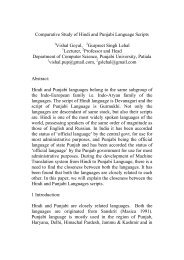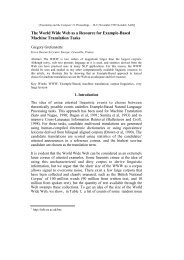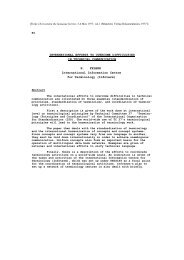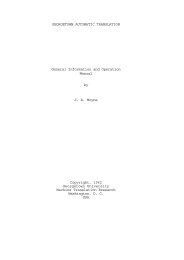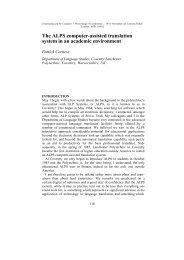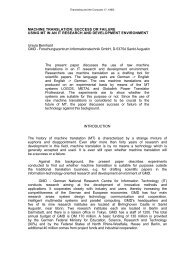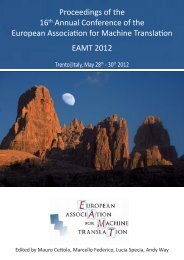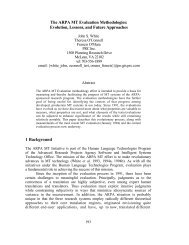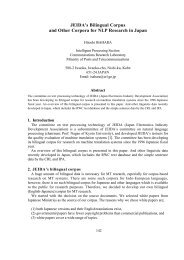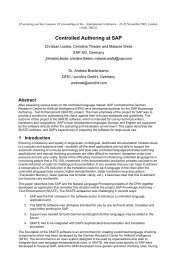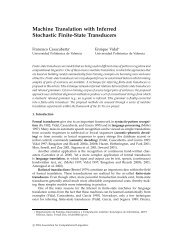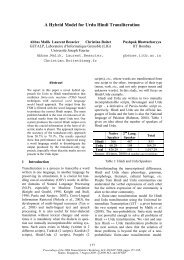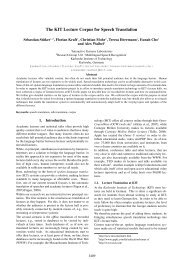pidgin translation - Machine Translation Archive
pidgin translation - Machine Translation Archive
pidgin translation - Machine Translation Archive
Create successful ePaper yourself
Turn your PDF publications into a flip-book with our unique Google optimized e-Paper software.
72 META<br />
Although one may sometimes lose sight of the fact, even <strong>translation</strong>s done<br />
by humans do not always reach the high standard that professional translators<br />
set themselves. In wide areas throughout the world, speakers having something<br />
less than mastery of a useful second language nevertheless manage to make<br />
themselves understood in it. Whole communities of these imperfect polyglots<br />
have developed mongrel tongues called generically « <strong>pidgin</strong>s » (Hall, 1954 2 ).<br />
Not only is the grammar of a <strong>pidgin</strong> English simplified from that of standard<br />
English, but a linguist can always detect considerable influence of the speaker's<br />
mother tongue on the <strong>pidgin</strong>. Thus the Chinese who asks for two piecee apple<br />
(2 apples) or the French speaker who says me, I am not in agreement (personally,<br />
I don't agree) is recognizably carrying over features of his native language into<br />
his « English ».<br />
However, we are not concerned with spoken <strong>pidgin</strong> in this article beyond<br />
showing why the term <strong>pidgin</strong> can be loosely applied to <strong>translation</strong>s already<br />
produced by CT, and to artificial language intended for CT production in the<br />
future. Masterman observed pithily that « machine <strong>translation</strong> always is a <strong>pidgin</strong> »<br />
(Masterman, 1967). She meant that the output from CT systems shows all too<br />
obvious vestiges of the language being translated. But this kind of <strong>pidgin</strong> is<br />
involuntary and unprincipled. It is therefore essentially different from what we<br />
have in view.<br />
Great problems still face anyone who aims to make CT rival traditional<br />
<strong>translation</strong>; to some of these problems no early solution can be expected (Bar-<br />
Hillel, 1964; Hofmann, 1968a). Consequently it is still worth discussing and<br />
investigating simpler kinds of <strong>translation</strong>. Taking a look first at traditional<br />
<strong>translation</strong>, we consider that it attempts a twofold task :<br />
a) to convey the cognitive meaning of the original;<br />
b) to re-express this meaning in a version of the target language that is<br />
stylistically acceptable, without losing any of the emotional and evaluative<br />
overtones imparted by nuances in the original.<br />
CT has typically been sponsored for the sake of obtaining speedy <strong>translation</strong>s<br />
of scientific and technical documents. For this purpose, task a) is far more<br />
important than b). We assert therefore that the prime requirement for CT products<br />
that their content should be understood by the readers for whom they are intended;<br />
one's feeling about the style of expression is, to say the least, a secondary<br />
consideration.<br />
In the past, CT researchers have not expected their readers to undergo any<br />
special training at reading the <strong>translation</strong>s in spite of some unaccustomed features<br />
in them. In some of the early systems, for instance, problems of ambiguity were<br />
partially overcome by the expedient of printing out small sets of alternative<br />
<strong>translation</strong>s and leaving readers to choose among them. This did not prove<br />
popular, presumably because « a reader is less confused by a text containing<br />
occasional vague equivalents than by one containing all the possible equivalents of<br />
2. The distinction between <strong>pidgin</strong>s and Creoles does not concern us here.<br />
Vol. 15 - N° 2<br />
Juin 1970



